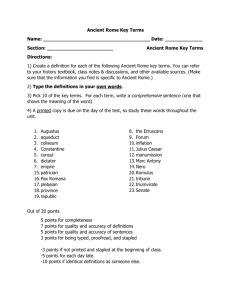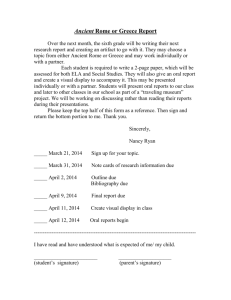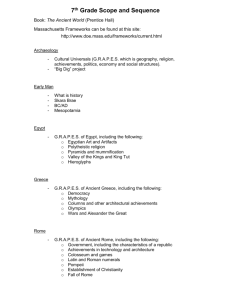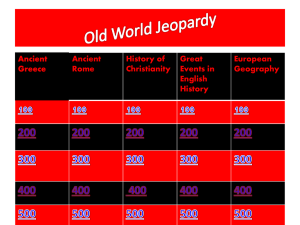Origins of Life
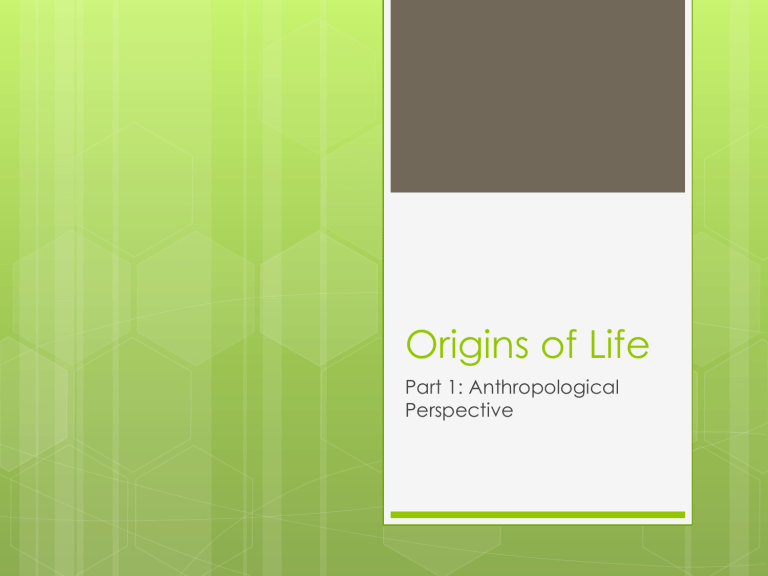
Origins of Life
Part 1: Anthropological
Perspective
Quick Write
Where and how did life begin?
How do you know this?
Anthropology
What is anthropology?
The study of human kind, past and present
Confronts and ponders major questions of human existence
Human Adaptability
Culture of human
Traditions and customs
Enculturation
How should we do things?
How do we make sense of the world?
What is right, and what is wrong?
http://listverse.com/2012/01/05/10-absurdlaws-from-around-the-world/
Culture
Not biological but uses biology
Learning, thinking, speaking, using tools etc.
Adaptation
The process by which organisms cope with the environmental forces and stresses posed by climate and landforms
Type of Adaptation Example
Pressurized airplane cabin with oxygen masks
Large “barrel chests” of native highlanders
More efficient respiratory system, to extract oxygen from “thin air”
Increased heart rate, hyperventilation
Rate of Change
Millions of years ago – foragers
Food production (12 – 10,000 years ago)
6 – 5,000 B.P. (before present) civilizations arose
Cultural Forces
Why are North American girls good at sports?
Why aren’t Latin American girls as good at sports?
Culture vs. Biology
Culture – eat vegetables, they are good for you
Biology –eat vegetables, they help you grow big and strong
Twins raised in vastly different environments will not look the same when they grow up
Why are people here good at football or cross country or golf but not skiing or hockey?
Think of some other examples
Cultural Anthropology
Social and cultural similarities and differences
Archaeological Anthropology
Uses remains to reconstruct, describe, and interpret human behavior
Biological Anthropology
1. Human evolution as revealed by the fossil record
2. Human genetics
3. Human growth and development
4. Human biological plasticity
5. The biology, evolution, behavior, and social life of monkeys, apes, and other nonhuman primates
Ancient Civilizations
Assignment:
Choose an ancient city
Use valid sources to come up with facts about each city and be sure to include trade, technology, writing, buildings, and religion.
Follow the description in the assignment given to you.
Ancient Cities
Ancient China
Anglo Saxon Britain
Aztecs
Benin
Byzantium
Egypt
Great Zimbabwe
Minoans
Moche
Phoenicians
Tiwanaku
Imperial China
Incas
Indus Valley
Italian City States
Maya
Meroe
Mesopotamia
Mixtec
Mughal India
Romans
Types of Anthropologists
Urban – study problems health issues associated with urban population increases
Medical Anthropologists
Implication of disease and illness
Different cultures have difference perceptions
Foragers were not prone to epidemics. Why?
Ethics
Paleoanthropology
Study of human evolution through fossils
Paleontology
Study of ancient life through fossil records
Anthropometry
Measurement of human body parts and dimensions
BMIs – nutritional status of the people
Human Thought
Ancient Greece
Socrates
Divine spirit
Soul was immortal and would meet with judgment in the other world
Condemned to die by hemlock poisoning
Plato
Observed widespread corruption
Republics could only exist in other world
Virtuous rulers were a possibility
Protagoras
Father of Humanism
Man is the measure of all things
Didn’t accept the supernatural
Aristotle
Believed in one God
Immortality of the spirit BUT later believed spirit went with the body
God was the “prime mover” to get life started
Knowledge was received only through the earth signs (later revealed there was only 4)
Democritus and Leucippus
Universe was operating by chance
Epicurus
Survival of the fittest
Superstition was rooted in the supernatural
Abandoned religious beliefs – knowledge was gained through the 5 senses
Ancient Rome
1. People are unique
Value systems
Creativity corporate actions
Personal lives
2. Results of thoughts and words travel though fingers and tongue
Michelangelo, Raphael, da Vinci, Caesar, Hitler,
Churchill
3. Inner thoughts determine outward actions
Determined by family and society
Presuppositions (Proverbs 23:7 – as a man thinketh in his heart, so he is)
The way he looks at life
Basis for values and decisions
Inner thought world (how you think)
4. The need to understand where we are in today’s world
Philosophic (basic questions of life)
Scientific
Physical universe
What is discovered + technology
Religious
Determines direction of their lives and society
5. Roman culture was influenced by the
Greeks
Gods were amplified humanity
People were nothing
No base for life, moral or values
Authoritarian system
Emperors were worshipped as gods
Human gods = poor foundation, Rome collapsed
6. Romans vs. Christians
7. Fall of Rome
No morals
Gratification of self (Hedonism)
Apathy of people
Lack of the arts
Increased government control
Inflation
Middle Ages – After the fall of
Rome
Social and Political Turmoil
Decline in learning
Materialism
Church (esp. Catholicism) were important in setting rules, baptism
Renaissance
Man became increasingly independent
Art
Latin Church – divided
Bible was interpreted
Rise of Modern Science
Scientific revolution rested upon the Bible
Christian base made science possible
God made a cause and effect universe
Assignment
Create-a-quiz!
Using your notes, create a quiz for other students in the class.
15 – 20 questions
You and a partner should include:
Ancient Greek information
Ancient Rome information
Renaissance
Middles Ages
Rise of Science

